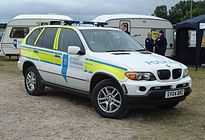Northern Constabulary
| Northern Constabulary | |
 | |
| Northern Constabulary vehicle. | |
| Motto | Dion is Cuidich (Gaelic) |
| Protect and Serve | |
| Agency overview | |
|---|---|
| Formed | 16 May, 1975 (merger) |
| Dissolved | 2013 (amalgamation) |
| Superseding agency | Police Service of Scotland |
| Legal personality | Governmental: Government agency |
| Jurisdictional structure | |
| Operations jurisdiction* | Police area of Highland, Western Isles, Orkney Isles and Shetland Isles, UK |
 | |
| Map of Northern Constabulary's jurisdiction. | |
| Size | 31,186 km² |
| Population | approx. 300,000 |
| General nature |
|
| Operational structure | |
| Headquarters | Inverness |
| Sworn members | Approx 715 |
| Agency executive | George Graham, Chief Constable |
| Divisions or Area Commands | 8 |
| Facilities | |
| Stations | 71 |
| Website | |
| www.northern.police.uk | |
| Footnotes | |
| * Police area agency: Prescribed geographic area in the country, over which the agency has usual operational jurisdiction. | |
The Northern Constabulary (Scottish Gaelic: Poileas a' Chinn a Tuath) was the territorial police force responsible for Northern Scotland, covering the Highland council area along with the Western Isles, the Orkney Isles and the Shetland Isles, which comprise most of the Highlands and Islands area. It was the police force covering the largest geographical area in the United Kingdom, equivalent to the size of Belgium, but was one of the smallest in terms of officers, with about 715 officers.[1]
History
This police force was formed on 16 May 1975 as a merger of the pre-existing Northern Constabulary, the Ross and Sutherland Constabulary (itself a merger of Ross and Cromarty Constabulary and Sutherland Constabulary) and the Inverness Constabulary (a merger of Inverness Burgh Police and Inverness-shire Constabulary), along with the northernmost portion of the Argyll County Police area, and the Nairn part of the Scottish North East Counties Constabulary. The previous Northern Constabulary had been created in 1969 by the merger of the Caithness Constabulary, Orkney Constabulary and Zetland Constabulary.
The new Northern Constabulary was created at the same time as local government reorganisation created the Highland regional council and the islands councils of the Western Isles, the Orkney Isles and the Shetland Isles. The rest of the Argyll County Police was merged into the Strathclyde Police, and the rest of the Scottish North East Counties Constabulary into the Grampian Police.
The Northern Constabulary area was the same as that covered by the Highlands and Islands Fire and Rescue Service.
In order to help keep decision-making as local as possible, Northern was at the forefront nationally in Devolved Resource Management (DRM) for many years. The Chief Constable allocated one-line budgets to each of his Area Commanders, closely monitoring progress across a range of indicators, over the year, through regular Performance Review and Performance Review Boards.
An Act of the Scottish Parliament, the Police and Fire Reform (Scotland) Act 2012, created a single Police Service of Scotland - known as Police Scotland - with effect from 1 April 2013.[2] This merged the eight regional police forces in Scotland (including Northern Constabulary), together with the Scottish Crime and Drug Enforcement Agency, into a single service covering the whole of Scotland.[3] Police Scotland has its headquarters at the Scottish Police College at Tulliallan in Fife.
Divisions & Area Commands
Northern Constabulary was split into three Divisions which were North, Central and East. In these three Divisions there were eight Area Commands, each with their own Area Commander.[4] The Area Commands were:
- Caithness Sutherland & East Ross
- Orkney
- Shetland
- Ross & Cromarty
- Lochaber, Skye & Lochalsh
- Western Isles
- Inverness
- Badenoch, Strathspey & Nairn
Uniform
Until the early 21st century, the uniform consisted of a white shirt, black tie and a stab-proof vest. Northern Constabulary was the last police force in Scotland using shirts and ties. In 2009, the uniform changed to become similar to that of other police forces of Scotland: black shirt with force logo, stab-proof vest and black trousers.
Footnotes
- ↑ Justice Support to Local Authorities, The Annual Report of the Scottish Executive
- ↑ STV News, 30 October 2012
- ↑ "Police and fire service merger 'would save £1.7bn'". stv.tv. 17 January 2012. Retrieved 19 January 2012.
- ↑ Northern Constabulary Divisions northern.police.uk, accessed 31 December 2009
External links
| ||||||||||||||||||||||||||||||||||